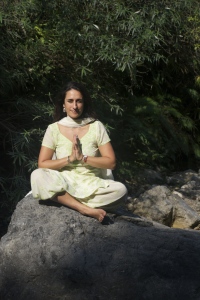Meditation – Mindfulness
Stress Management
After many years of study and self practice Tania has developed her own blend of Meditation, Pranayama and Mindfulness techniques leading to her becoming a respected teacher working with private and group classes. We are now proud to offer consultation on a client by client basis.
Tania is a highly experienced instructor who as well as having held the role of the official meditation teacher at the UK Houses of Parliament recently worked as the official meditation teacher at a Yoga Alliance Certified Yoga Teacher Training (YTT500) school in Rishikesh, India (the birthplace of yoga). Tania has many private clients that have come to her with a range of stress related issues, breathing disorders or a general interest in the benefits meditation and mindfulness can provide. Some of these clients have been recommended to her via their health professionals. We also offer Stress Management seminars and courses for businesses both on and off site.
Meditation can provide a wide range of positive benefits that could benefit people of all ages and backgrounds. Although it has been known for 1000’s of years that meditation can provide a clearer view of the world around us, it is only recently that scientific studies have consistently shown meditation can provide both physical and mental benefits. On a physical level meditation lowers high blood pressure, reduces anxiety attacks, and decreases tension-related pain. In addition, serotonin production is increased which improves mood and the immune system is strengthened.
Mental benefits of Meditation include reduction in anxiety and increased clarity of thought. A regular meditation practice can improve emotional stability, which can lead to an overall increase in happiness.
Many businesses now rely on meditation to help employees for example in January 2015 the Harvard business review said; “Mindfulness should no longer be considered a “nice-to-have” for executives. It’s a “must-have”: a way to keep our brains healthy, to support self-regulation and effective decision-making capabilities, and to protect ourselves from toxic stress.”
Further a series of studies at Harvard University have shown meditation has additional long term benefits. A recent study showed that within a period of just 8 weeks participants were feeling less stressed while also expressing feelings of a greater sense of well being.
Tania’s long journey of learning has taken her to extensive training courses with some of the world’s renowned teachers across three continents and she has amassed over 1000 hours of training, in addition to more than 20 years of practice. As well as leading private and group yoga and meditation lessons Tania also won a grant last year to develop a yogic program to aid dementia sufferers, which has been featured recently in OM yoga magazine.
Meditation and mindfulness was discussed at recently in Parliament where Lord Andrew Stone told an all party meeting he used mindfulness and meditation to steady himself after he became “scared” when he was dispatched to Cairo for meetings with Egypt’s military leadership in 2014. “I didn’t know how to cope,” he said. “But these practices made a massive difference. I was talking to some pretty serious people there, but I was being compassionate to all sides.”
Tracey Crouch MP, one of only a small number of MPs to publicly admit using anti-depressants, revealed to the same group mindfulness practice had helped her come off the drugs. “I have given much better speeches in the House since I started mindfulness,” she said. “We genuinely can turn the UK into a mindful nation.”
Client Testimony:
I used to go to the dentist every 6 months without fail but I had a very bad experience with a new dentist whilst having a filling over 10 years ago. I have tried 2 different dental practices since then – on the last visit I couldn’t go through with the examination or even have an x-ray as I couldn’t control my distress – tears were running down my face and I was heaving so the dentist gave up.
It took me 2 years to get around to booking an appointment with a different dental practice and on the day of the appointment my anxiety levels were extremely high and I felt sick at the thought of going. I couldn’t eat my lunch and struggled to even put my toothbrush in my mouth to clean my teeth!
I sat in the waiting room and noticed that my breathing was very shallow and rapid and as I was the only person in the waiting room I closed my eyes and focused my mind on my breathing and started to take long deep breaths. Once I had slowed down my breathing I then moved on to the third eye technique imagining the breath going into one palm and then the other – I can’t remember what it is called.
In the dentist’s chair I continued with the awareness of my breathing. I managed to have x-rays and a check-up without crying or retching! I had to then go back for a hygienist appointment! Again I went through the anxieties at home but in the waiting room I again focusing on my breathing. Incredibly I was able to remain in the hygienist’s chair for 30 minutes without any distress! In the chair I used the third eye technique. I do think it is down to the meditation techniques you have shown me. I was absolutely delighted that I was able to conquer this.
Karen Saunders
NHS recommending Mindfulness to treat stress, anxiety and depression.
http://www.nhs.uk/conditions/stress-anxiety-depression/pages/mindfulness.aspx
Examples of places the NHS uses Mindfulness as a therapy:
The Sussex Partnership has a mindfulness research centre working with NHS staff and patients with mental health problems.
Lancashire Care NHS Trust uses mindfulness for mental health, Gloucestershire NHS Trust uses it to treat pain, and the Nottingham Centre for Mindfulness has trained more than 100 MBCT teachers.
In London, Guy’s and St Thomas’ and King’s College hospitals use mindfulness-based stress reduction (MBSR), not only for stress and chronic pain but for other symptoms including sleep problems, daytime fatigue, headaches, migraines, IBS and depression.


